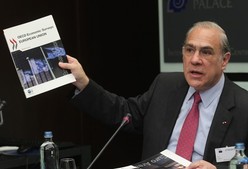OECD moots 1trillion euros bailout fund
Eurozone bailout funds need to be increased substantially to at least euros 1 trillion (pounds 836.3 billion), the head of the Organisation for Economic Cooperation and Development (OECD) has stressed.

The current euros 440 billion European Financial Stability Facility (EFSF) is not large enough to restore market confidence, said Angel Gurra, secretary general of the international economic think tank presenting its latest report here Tuesday.
Claiming that a larger rescue fund would give eurozone governments more room to concentrate on restoring growth and competitiveness to the region, Gurria said, "The mother of all firewalls should be in place, strong enough, broad enough, deep enough, tall enough, just big."
The OECD has warned that the region's banks remain weak. With debt levels still rising and governments' fiscal targets far from assured, Gurria said Eurozone finance ministers need to impress the financial markets with the size of their rescue fund for indebted countries when they meet later this week.
The temporary EFSF is due to expire in June 2013.
At their meeting eurozone finance ministers are expected to agree on combining the two rescue funds for the 17 euro currency nations the European Financial Stability Facility (EFSF) with its permanent European Stability Mechanism (ESM).
The permanent ESM, has a lending capacity of euros 500 billion and comes into operation this summer.
"A large, permanent bailout fund can give governments the breathing space to focus on kickstarting growth and restoring the competitiveness of their economies," Gurria said.
Proposals to operate the two funds in parallel for longer have been met with resistance from some of the funds' largest contributors, especially Germany.
Gurria stressed that despite calmer financial markets , the eurozone's public debt crisis is not over,.
German Chancellor Angela Merkel signalled for the first time on Monday that she was prepared to consider boosting the firewall's resources.
As the bloc's economy flounders for the second time in just three years, the OECD report underlined the need for ambitious economic reforms.
In its economic projections, the OECD expressed optimism of 0.2 per cent growth, taking a divergent view from that of the International Monetary Fund and the European Commission which fear a contraction.
Source: Europe News.Net
- 536 reads
Human Rights
Fostering a More Humane World: The 28th Eurasian Economic Summi

Conscience, Hope, and Action: Keys to Global Peace and Sustainability

Ringing FOWPAL’s Peace Bell for the World:Nobel Peace Prize Laureates’ Visions and Actions

Protecting the World’s Cultural Diversity for a Sustainable Future

Puppet Show I International Friendship Day 2020

